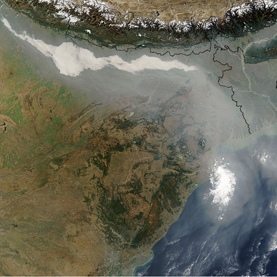
Cutting Black Carbon and Methane
Promises Immediate Climate Change Impacts
Reducing emissions of black carbon and methane can
be done today with existing technologies, and could
significantly slow climate change
Feb 05, 2011 - Lauren Morello - ClimateWire
- scientificamerican.com 
CLIMATE CURB?: Cutting emissions of so-called black
carbon--soot and other aerosols--as well as methane
could stave off catastrophic climate change. Image:
Courtesy of Visible Earth, NASA.gov
Placing strict limits on a handful of common air
pollutants could pay big dividends for efforts to
limit climate change, improve public health and increase
agricultural productivity, according to a new U.N.
report.
Curbing emissions of black carbon, a component of
soot, along with methane and tropospheric ozone,
could cut projected climate warming by 0.5 degree
Celsius, or about 0.9 degrees Fahrenheit, by 2070.
Such cuts could be made with existing technology,
the report says, and would "have immediate and
multiple benefits for human well-being."
Possible strategies for reducing black carbon, methane
and ozone include capturing methane produced by landfills
and fossil fuel extraction, introducing cleaner-burning
cookstoves, installing particulate filters on diesel
engines and banning the practice of burning fields
of agricultural waste.
The research shows that cutting black carbon and
methane emissions would slow the rate of warming
up until about 2040, while starting soon to cut emissions
of carbon dioxide would only have an appreciable
effect after 2040.
Drew Shindell, the scientist who coordinated the
international team that wrote the new report, said
that suggests that both approaches are needed.
"When you put them together, this is the only
scenario when you have a reasonable fighting chance
of staying below the 2 degree [Celsius] target," said
Shindell, a climate researcher at NASA's Goddard
Institute of Space Studies. "One targets the
near term; one targets the long term."
Meanwhile, limiting emissions of black carbon and
chemicals that react with sunlight to form tropospheric
ozone could prevent 2.4 million premature deaths
and the loss of 1 to 4 percent of the global output
of maize, rice, soybean and wheat each year, the
analysis found.
Looking for impetus from governments
Shindell and other researchers who worked on the
new report presented their findings over the weekend
at the annual meeting of the American Association
for the Advancement of Science.
The study was supported by the U.N. Environment
Programme, the World Meteorological Organization
and the Stockholm Environment Institute. The analysis
will be delivered tomorrow to the U.N. environment
body's governing council at a meeting in Nairobi,
Kenya.
"Hopefully, there will be some impetus there
to move forward," said Ashbindu Singh, chief
of UNEP's Division of Early Warning and Assessment. "UNEP
on its own cannot do much unless the governments
tell us what to do."
UNEP commissioned the study, originally asking researchers
to examine the effect of cutting emissions of black
carbon, a particle produced by burning fossil fuels
and biofuels like wood and dung.
Shindell said researchers expanded the analysis
to look at chemicals like methane and precursors
to ozone because they are emitted by the same processes
-- like biomass burning -- that produce black carbon.
Like black carbon, methane and ozone are potent
-- albeit short-lived -- greenhouse warmers. Black
carbon, for example, lingers in the atmosphere for
weeks, compared to CO2, which can last for centuries
to millennia.
All three can damage human health, while ozone can
lower crop yields.
Meanwhile, black carbon acts in several ways to
accelerate climate change. It absorbs heat from sunlight,
warming the surrounding air. When particles of black
carbon fall from the atmosphere on ice or snow, they
hasten melting. Shindell's earlier work suggests
that black carbon emissions caused half the total
warming in the Arctic between 1890 and 2007.

|



